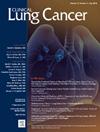对未经治疗的晚期表皮生长因子受体突变非小细胞肺癌患者进行ctDNA指导下的呋莫尼联合治疗或呋莫尼单药治疗的II期随机多中心研究设计:FOCUS-C 研究
IF 3.3
3区 医学
Q2 ONCOLOGY
引用次数: 0
摘要
背景第三代表皮生长因子受体酪氨酸激酶抑制剂(EGFR-TKIs)对具有典型表皮生长因子受体突变的晚期非小细胞肺癌(NSCLC)患者具有显著的抗肿瘤活性。然而,EGFR-TKI单药治疗在EGFR突变的循环肿瘤细胞DNA(ctDNA)不能被快速清除的患者中疗效不佳。材料与方法 作为第三代TKI,呋莫替尼显示出卓越的抗肿瘤活性和轻微的毒性。FOCUS-C研究是一项前瞻性、多中心、随机对照试验(NCT05334277),旨在探讨呋莫尼替尼联合培美曲塞-铂双联化疗联合或不联合贝伐单抗与呋莫尼替尼单药治疗未经治疗的晚期EGFR突变NSCLC患者的疗效和安全性。未清除ctDNA的患者将按2:2:1的比例随机分为B1组(呋莫替尼)、B2组(呋莫替尼联合卡铂和培美曲塞治疗4个周期,然后呋莫替尼和培美曲塞作为维持治疗)和B3组(B2组方案加贝伐单抗)。主要终点是B2/B1组的无进展生存期(PFS)。次要终点包括B3/B1组的无进展生存期、A/B1组的无进展生存期、B3/B2组的无进展生存期、客观反应和疾病控制率、总生存期以及所有治疗组的安全性。本研究将评估呋莫尼替尼联合卡铂和培美曲塞联合或不联合贝伐珠单抗与呋莫尼替尼单药在未经治疗且未清除表皮生长因子受体的晚期表皮生长因子受体突变 NSCLC 患者中的疗效和耐受性。本文章由计算机程序翻译,如有差异,请以英文原文为准。
The Design for a Phase II, Randomized, Multicenter Study of CtDNA-Guided Treatment With Furmonertinib Combined Therapy or Furmonertinib Alone for Untreated Advanced EGFR Mutant Non–small-cell Lung Cancer Patients: The FOCUS-C Study
Background
Third-generation epidermal growth factor receptor tyrosine kinase inhibitors (EGFR-TKIs) have significant antitumor activity to advanced non–small-cell lung cancer (NSCLC) patients with classic EGFR mutations. However, EGFR-TKI monotherapy shows poor efficacy in patients whose circulating tumor cell DNA (ctDNA) of EGFR mutations cannot be rapidly cleared.
Materials and Methods
As a third-generation TKI, furmonertinib has shown superior antitumor activity and minor toxicity. The FOCUS-C study is a prospective, multicenter, randomized controlled trial (NCT05334277) to explore the efficacy and safety of furmonertinib plus pemetrexed-platinum doublet chemotherapy with or without bevacizumab versus furmonertinib monotherapy in untreated advanced EGFR mutant NSCLC patients without EGFR clearance after the induction therapy of furmonertinib. Patients with EGFR clearance will still receive furmonertinib as Arm A. Patients without ctDNA clearance will be randomized in a 2:2:1 ratio as Arm B1 (furmonertinib), Arm B2 (furmonertinib combined with carboplatin and pemetrexed for 4 cycles, and then furmonertinib and pemetrexed as maintenance therapy) and Arm B3 (Arm B2 regimen plus bevacizumab). The primary endpoint is progression-free survival (PFS) in Arm B2/B1. Secondary endpoints include PFS in Arm B3/B1, PFS in Arm A/B1, PFS in Arm B3/B2, objective response and disease control rate, overall survival and safety in all Arms. Exploratory endpoints are focused on the efficacy based on plasma NGS at different timepoints.
Conclusion
This study will evaluate the efficacy and tolerability of furmonertinib plus carboplatin and pemetrexed with or without bevacizumab verses furmonertinib alone in untreated patients with advanced EGFR mutant NSCLC without EGFR clearance.
求助全文
通过发布文献求助,成功后即可免费获取论文全文。
去求助
来源期刊

Clinical lung cancer
医学-肿瘤学
CiteScore
7.00
自引率
2.80%
发文量
159
审稿时长
24 days
期刊介绍:
Clinical Lung Cancer is a peer-reviewed bimonthly journal that publishes original articles describing various aspects of clinical and translational research of lung cancer. Clinical Lung Cancer is devoted to articles on detection, diagnosis, prevention, and treatment of lung cancer. The main emphasis is on recent scientific developments in all areas related to lung cancer. Specific areas of interest include clinical research and mechanistic approaches; drug sensitivity and resistance; gene and antisense therapy; pathology, markers, and prognostic indicators; chemoprevention strategies; multimodality therapy; and integration of various approaches.
 求助内容:
求助内容: 应助结果提醒方式:
应助结果提醒方式:


